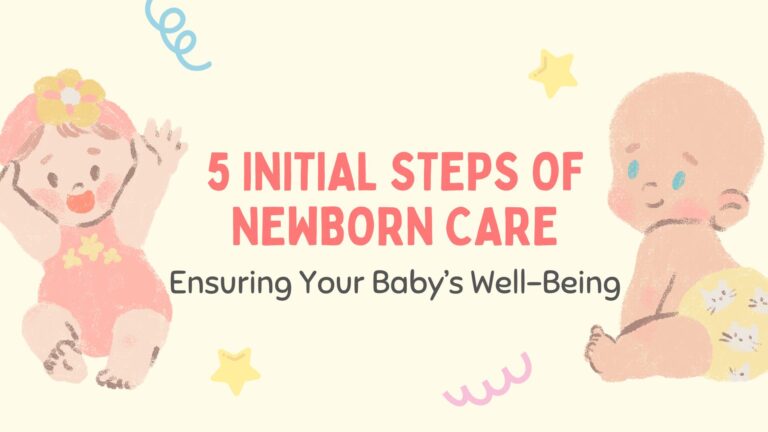Bringing a newborn home is an exciting yet overwhelming experience. Those early days are crucial for laying the foundation of your baby’s health and well-being. Newborns require specialized care, and as a new parent, understanding the essential steps to care for your infant can make all the difference. This guide will walk you through the five initial steps of newborn care to ensure your baby’s safety, comfort, and growth.

1. Skin-to-Skin Contact
The Importance of Skin-to-Skin
One of the first and most vital actions after birth is skin-to-skin contact. Placing your baby on your bare chest helps regulate their body temperature, heart rate, and breathing. It also creates a strong bond between parent and baby.
- Benefits:
- Encourages breastfeeding initiation.
- Calms the baby and reduces crying.
- Stabilizes the baby’s glucose levels.
How to Practice Skin-to-Skin
Make sure the baby is only wearing a diaper, and cover them with a blanket to keep them warm. Skin-to-skin contact can be practiced by both parents to foster bonding and comfort.
2. Breastfeeding and Feeding
Early Feeding Cues
Feeding your newborn within the first hour of life is crucial, especially if you choose to breastfeed. Breastfeeding helps with the baby’s immunity as colostrum, the first milk, is rich in antibodies and nutrients.
- Signs your baby is ready to feed:
- Lip smacking.
- Rooting (turning head towards a breast or bottle).
- Sucking on fingers.
Breastfeeding Tips
- Hold your baby in a comfortable position and make sure they latch properly to avoid discomfort.
- Nurse on demand, as newborns typically feed every 2 to 3 hours.
Formula Feeding
If you decide to formula feed, ensure the milk is prepared according to the instructions and monitor your baby for signs of hunger and fullness. Always sterilize bottles and feeding equipment.

3. Umbilical Cord Care
Keeping the Cord Dry and Clean
The umbilical cord stump typically falls off within 1 to 3 weeks. Keeping the area clean and dry is essential to avoid infection.
- Care tips:
- Clean the area gently with a sponge bath.
- Fold the diaper below the cord to keep it dry and avoid irritation.
- Avoid submerging the baby in water until the cord falls off naturally.
Signs of Infection
Look for signs of infection, such as redness, swelling, or a foul smell around the cord area. If these occur, consult your pediatrician immediately.
4. Temperature Regulation
Dressing Your Newborn
Newborns cannot regulate their body temperature as efficiently as adults, so it’s essential to keep them warm but not overheated.
- Dressing guidelines:
- Dress your baby in one more layer of clothing than you are wearing.
- Use light blankets to swaddle your baby and provide warmth without overheating.
Room Temperature
Keep the room temperature between 68-72°F (20-22°C) to ensure your baby is comfortable. Avoid placing your baby directly in front of fans, air conditioning vents, or heaters.

5. Sleeping and Safe Sleep Practices
Safe Sleep Environment
Newborns sleep for up to 16 hours a day, but ensuring that their sleeping environment is safe is crucial to preventing Sudden Infant Death Syndrome (SIDS).
- Key safe sleep practices:
- Always place your baby on their back to sleep.
- Use a firm sleep surface, like a crib or bassinet, without pillows, blankets, or stuffed animals.
- Share the same room with your baby but avoid co-sleeping in the same bed.
Sleep Cycles
Newborns often wake frequently to feed. Understanding your baby’s sleep cycle can help you establish a routine, ensuring they get enough rest while adapting to nighttime feedings.
Conclusion
Caring for a newborn can seem daunting, but by focusing on these initial steps, you can ensure your baby’s well-being and start building a strong foundation for their health and development. Skin-to-skin contact, proper feeding, umbilical cord care, temperature regulation, and safe sleep practices are essential in those early days of life. Every baby is unique, so be patient as you and your newborn adjust to this new journey together.
FAQs
What are the signs that my newborn is getting enough milk?
Your baby should have 6-8 wet diapers per day, gain weight steadily, and appear satisfied after feedings.
How do I know if my baby is too hot or cold?
Feel the back of their neck. If it feels hot or sweaty, they may be too warm. If their hands or feet are cool, they might need an extra layer.
How can I prevent diaper rash while caring for the umbilical cord?
Change diapers frequently and avoid covering the umbilical cord area. Apply diaper cream as needed to protect the skin.
How much sleep should my newborn be getting?
Newborns typically sleep 14-17 hours a day, in short cycles of 2-4 hours. Feeding and changing routines will often interrupt their sleep in the early weeks.


